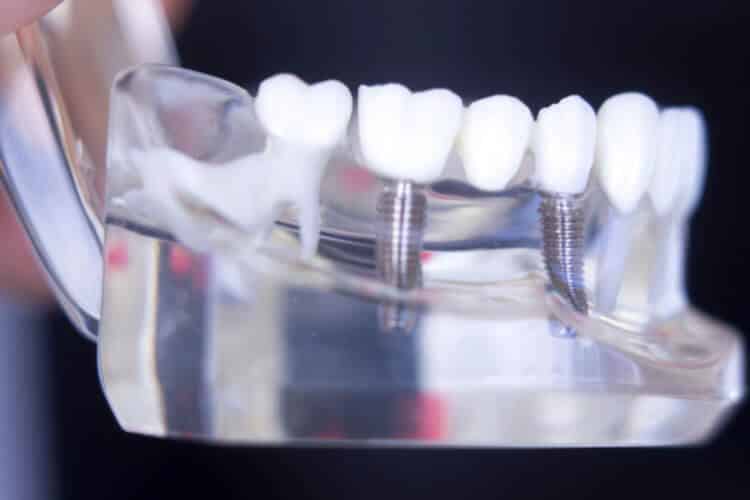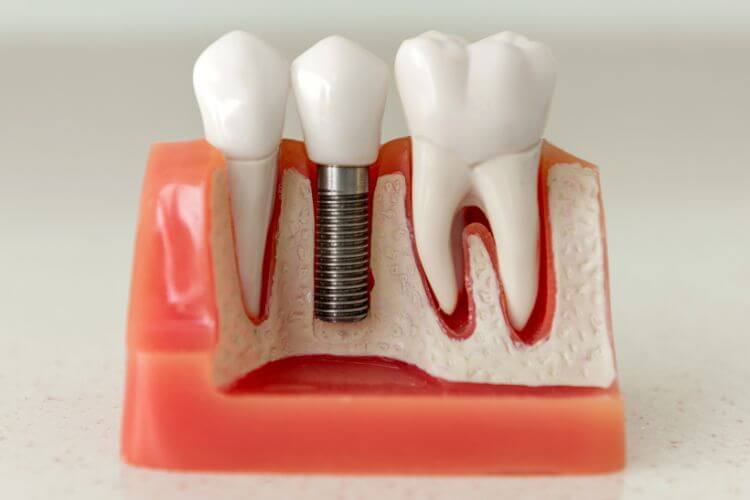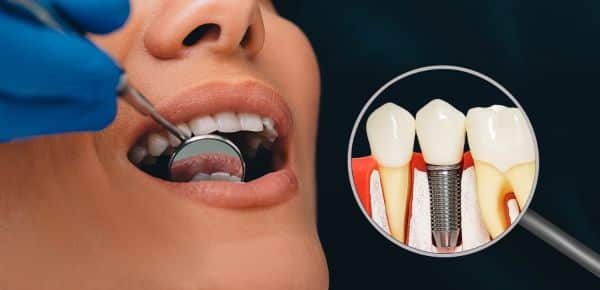Welcome to our comprehensive guide on dental implants value. Whether you’re considering dental implants as a solution for missing teeth, desire to restore your natural smile, or are simply curious about this dental innovation, you’re in the right place!
A brilliant smile goes beyond being simply a pleasant aesthetic, and honestly, just thinking about dental implants can appear a bit unnerving. But don’t fret! We’ve crafted this easy-to-understand guide to help demystify all about dental implants and highlight their immense value in achieving oral health and happiness.
With an impressive lifespan, the potential for improved speech, comfort, and enhanced overall oral health, dental implants sure bring a broad smile to our faces! So, let’s dive right in and unravel the world of dental implants together!
Table of Contents
Understanding Dental Implants
Dental implants, one of the miracles of modern dentistry, have revolutionized the way we view oral health. They provide long-term solutions to people troubled by missing teeth — a gateway to renewed confidence and a brilliant smile. But what exactly are dental implants? What types are out there, and what materials are used in their construction? Let’s explore these fascinating questions in greater depth.
What are Dental Implants?
What’s unique about dental implants is that unlike other tooth replacement options, they replace the whole tooth, including the root. This is beneficial because it preserves the integrity of the jawbone, which would otherwise deteriorate without the stress and stimulation caused by normal chewing.
Essentially, dental implants are artificial tooth root replacements made from very strong and biocompatible materials. They are surgically placed into the jawbone where the tooth is missing. Over time, the bone in your jaw grows and fuses with the implant, making it a permanent fixture. This gives the future artificial tooth or teeth a sturdy base, allowing you to eat and speak as you would with natural teeth, offering more comfort and stability than traditional dentures or bridges.
Types of Dental Implants
There are primarily two types of dental implants: Endosteal and Subperiosteal.
- Endosteal implants: These are the most common types. The procedure involves placing an implant directly into the jawbone, acting as an artificial root. It’s followed by a second surgery to connect a post to the original implant upon which the artificial tooth, or teeth, is mounted.
- Subperiosteal implants: Unlike endosteal implants, these are placed under the gum but on or above the jawbone. This type of implant is used for patients who have a shallow jawbone and cannot or do not want to undergo a procedure to rebuild it.
Materials Used in Dental Implants
“A thing of beauty is a joy forever”, as Keats once penned. And while we’re sure he wasn’t talking about dental implants, the principle remains: the materials used in their construction need to be biocompatible, durable, and capable of seamlessly blending with existing teeth. The most commonly used materials in dental implants are:
- Titanium: This is the most common material used due to its high strength, durability, and biocompatibility. Titanium dental implants have shown excellent long-term success in scientific studies.
- Zirconium: Zirconium is a relatively newer material that boasts of similar strength and biocompatibility, with the added benefit of a more tooth-like color. It’s quickly becoming a popular choice for anterior (front) teeth implants.
Discovering the world of dental implants is akin to unearthing a hidden treasure of dental science. By replicating the structure and function of natural teeth, dental implants offer a promising and permanent dental replacement solution, restoring not just your teeth, but your confidence, smile, and quality of life. 🦷✨
The Value of Dental Implants
In our smiles and conversations, we display our teeth without even thinking about it. But, when tooth loss happens, it greatly impacts not only our appearance but also our self-esteem and quality of life. Don’t despair; dental implants have come to the rescue! They’ve transformed the world of dentistry, offering a solution that not only looks but also feels and functions like natural teeth.
Durability and Longevity
“Wait, will they last?” – a question we often get when discussing dental implants. The quick answer is: absolutely! One of the key benefits of dental implants is their superior durability and longevity. Unlike dentures and bridges that need frequent adjustments or replacements, dental implants can last a lifetime if properly cared for. Dental implants provide a long-lasting solution for missing teeth. They’re a worthwhile investment in a radiant long-lasting smile that will stand the test of time! 😁
Improved Speech
How clear our words come out often depends on our teeth. Anyone who’s struggled with poorly fitting dentures can narrate the tales of mumbling or slurring words. But guess what? Dental implants save the day! 😃 They improve speech by eliminating these common problems. Dental implants offer a snug fit; they feel just like your natural teeth. Now you can chat away in total confidence!
Comfort and Convenience
Ever imagine what it would be like to ditch the nightly ritual of removing dentures? With dental implants, this dream becomes a reality! An amazing advantage of dental implants is the comfort and convenience they offer. There’s no discomfort or constant adjustments as with dentures. And the best part? You get to say goodbye to messy adhesives! Dental implants are a sigh of relief to many patients making them worth every cent!
Retained Facial Structures
A glowing smile goes beyond teeth; it’s greatly tied to one’s facial structure. Losing a tooth can lead to gradual bone loss which in turn, alters the facial structure over time, making one appear older. However, dental implants are a game-changer! 😊 They aid in retaining the face’s natural shape and smile. Not only does this excite us, but it also contributes significantly to an individual’s confidence. Go on, let your smile radiate that youthful glow!
Better Oral Health
For a moment, let’s think about our neighboring teeth. Traditional bridges involve grinding away these teeth to anchor the new bridge, compromising their long-term health. Dental implants, on the other hand, honor these innocent bystanders. 😉 They do not affect neighboring healthy teeth and contribute to better oral hygiene. With dental implants, you keep more of your natural teeth intact, which leads to improved oral health in the long run.
Dental implants are truly innovative and have revolutionized restorative dentistry. Their durability, ability to improve speech, comfort, and contribution to facial structure retention, as well as better oral health, make them an incredibly valuable solution for anyone coping with tooth loss. Smile brightly with dental implants!
Procedure of Getting Dental Implants
Improve your smile in three essential steps! 😁 Dental implants can be a fantastic solution to replace missing or damaged teeth, but what’s the process actually like? In this section, we’ll break down the three core stages of receiving dental implants: consultation and planning, the surgical procedure itself, and the recovery and aftercare journey.
Consultation and Planning
The journey to your brand new smile begins at your dentist’s office. The first step is a comprehensive dental examination where your dentist may take X-rays and 3D images, assess your oral health, and discuss treatment options. At this stage, it’s crucial to:
- Open up about your medical history: This includes any health conditions or medications you are currently taking. Certain conditions, like diabetes, can affect the healing process post-surgery.
- Discuss your personal preferences: How do you envision your smile post-surgery? Communicate this to your dentist.
- Prepare for cost and time: Dental implant surgeries require both time commitment and financial planning. Your dentist will discuss these details with you to ensure you’re ready for the journey ahead.
Remember to ask all your questions, such as risks, benefits, and alternatives, during this session. It’s your smile and your journey; make sure you’re confident before proceeding.
Surgical Procedure
Once your personalized treatment plan is in place, you’re ready for the surgical procedure. Don’t let the term ‘surgery’ frighten you – this can often be done in one visit! The process typically involves:
- Anesthesia: You won’t feel any pain during the procedure as you’ll be numbed by local anesthesia.
- Implant Placement: The dentist will place the dental implant in your jawbone where your tooth root used to be. Over time, this implant fuses with your bone, creating a sturdy base for your new tooth.
- Wait: The implant needs time to bond with the bone, which can take several weeks or months.
It’s essential to remember that everyone’s experience with dental implant surgery is different. Recovery times and experiences will vary based on individual health circumstances and implant specifics.
Recovery and Aftercare
The final stage of your dental implant journey is all about healing and maintenance. Here, you’ll receive:
- Temporary crowns: While the area heals, you’ll wear temporary crowns.
- Recovery guidelines: Your dentist will provide guidance on eating, oral hygiene habits, and medication usage.
- Follow-up appointments: Regular check-ins with your dentist ensure everything is healing as it should, and the implants are functioning correctly.
Remember, the objective is a long-term healthy smile 😊. So, even after the treatment, brushing twice a day, flossing daily, and regular dental cleanings will be critical to maintain your shiny new teeth dental implants value.
And there you have it! The roadmap to a perfect smile is clear. Dental implants are an investment in not just your oral health, but your confidence and happiness. Just remember, the journey to a healthier smile is always worth the ride!
Cost and Financing Options for Dental Implants
Money might make the world go round, but it’s teeth that make your smiles shine bright. 😁 And if you’re considering dental implants, it’s wise to know about the cost and financing options available.
Cost Factors
When looking at the potential costs of dental implants, several factors can influence the final amount you’ll have to pay:
- Type of implant: Different types of dental implants are priced differently. For instance, endosteal implants, subperiosteal implants, and zygomatic implants all carry distinct costs.
- Material used: Dental implants can be made of different materials like titanium and zirconia which vary in price.
- Number of implants needed: Naturally, if you require more than one implant, your total cost will be higher.
- Geographical location: The cost of dental implants can vary significantly based on your location and the cost of living in that area.
- Dentist’s experience: Highly experienced dentists or specialists might charge more for their services.
Maximizing your savings while maintaining high-quality dental health can be a balancing act. Work alongside your dental health professional to understand the various factors that influence the costs of your dental implants.
Insurance Coverage
Many of us might think, “Why not let insurance handle it?” Unfortunately, not all insurance plans cover the cost of dental implants. Typically, dental insurance plans that do cover implants only cover part of the cost. Insurance plans may cover the procedure to an extent, but many have a cap on the amount they will pay annually.
Take the time to thoroughly review your insurance policy or chat with your representative to understand exactly what’s covered under your plan when it comes to dental implants.
Financing Options
For those not covered or not fully covered by insurance, there’s no need to frown. 😔 There are still ways to finance your dental implants. Let’s make that frown turn upside down. 😊
- Payment Plans: Many dental offices provide payment plans that spread out the cost of the treatment over a set period.
- Healthcare Credit Cards: These specialized credit cards can be used for various medical expenses, including dental work. They often come with interest-free periods.
- Personal loans: You can apply for a personal loan from your bank or another financial institution to cover the cost of your dental implants.
Breathing life back into your smile should be stress-free, and knowing your cost and financing options for dental implants can help. Remember, investing in dental implants is more than just a financial decision; it’s an investment in your dental health and your bright future smiles. 😊
Common Misconceptions about Dental Implants
Although dental implants have been around for several decades, there are still numerous myths and misconceptions that plague potential patients. From fears about the procedure being painful to doubts about their longevity, these misconceptions can often make people wary about opting for dental implants. However, as dental professionals, we believe it’s essential to debunk these myths and provide accurate, trustworthy information dental implants value.
Firstly, one widespread myth is that dental implant surgery is a painful process. This isn’t true. Dentists use local anesthesia during the procedure, which means you won’t feel any pain. Yes, there might be mild discomfort following the surgery, but it’s easily manageable with over-the-counter pain medication. Moreover, most patients report feeling much less discomfort than they anticipated.
Secondly, some people believe that dental implants don’t last long. But in reality, they’re one of the most durable dental restoration methods available. If properly taken care of, these implants can last for over two decades. With regular dental check-ups and good oral hygiene habits, your dental implants can even last a lifetime dental implants value.
Another pervasive myth is that implants look unnatural. The fact is that dental implants are designed to blend seamlessly with your natural teeth. They’re customized to match the shape and color of your existing teeth, ensuring that they look and feel as natural as possible.
Dental Implants Value
Here are a few more misconceptions that we’d like to clear up:
- Dental implants cause headaches: This is based on the unsupported idea that the dental implant’s metal can somehow interact negatively with your brain. There’s absolutely no scientific evidence to support this claim.
- It’s too hard to maintain dental implants: False. You merely need to take care of them as if they were your own, natural teeth – brush twice a day, floss regularly, and visit the dentist for check-ups.
- Only elderly people need dental implants: Wrong again. Anyone, regardless of age, can require dental implants due to an injury, dental disease, or severe decay.
Remember, getting the correct information is the key to making an informed decision, and the best source for this information is your very own dentist. So, don’t let misconceptions stand in your way. Have a chat with your dentist, and get all your doubts cleared. After all, with dental implants, you’re investing in the longevity of your smile! 😁
Conclusion
As we draw this informative journey to a close, we hope you’re now equipped with important insights about dental implants. These innovative solutions serve as sturdy bridges to a perfect smile, bringing immense value in terms of durability and longevity, improved speech, comfort, convenience, and overall oral health.
At Wilshire Smile Studio, we are determined to extend these benefits to as many people as we can through affordable prices and flexible financing options. We strive to dispel common misconceptions about dental implants to make the procedure approachable for everyone.
Remember, the path to a captivating smile is not traversed overnight. It starts with adequate consultation and planning, followed by a well-executed surgical procedure, and a mindful recovery process dental implants value.
When it comes to rebuilding your smile, your patience and commitment combined with our expertise make an unbeatable team. We look forward to welcoming you into our friendly and professional practice, helping you take that vital first step towards achieving your perfect smile dental implants value.
Book your free consultation with us online or call (323) DENTIST (323-336-8478) today.
Frequently Asked Questions
1. What are dental implants?
Dental implants are artificial tooth roots made of titanium that are surgically placed into the jawbone, providing a stable foundation for replacement teeth.
2. How long do dental implants last?
With proper care and maintenance, dental implants can last a lifetime. They are designed to be a long-term solution for replacing missing teeth.
3. Are dental implants a painful procedure?
During the dental implant procedure, local anesthesia is used to ensure a painless experience. After the procedure, patients may experience some discomfort, but it can be managed with over-the-counter pain medications.
4. Who is a good candidate for dental implants?
Generally, individuals with good oral health and sufficient jawbone density are good candidates for dental implants. However, each case is unique, and it is best to consult with a dental professional to determine eligibility.
5. Can dental implants improve the appearance of my smile?
Yes, dental implants can significantly improve the appearance of your smile. They look and feel like natural teeth, providing a seamless and aesthetically pleasing result.









